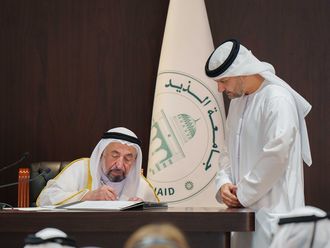Abu Dhabi
Although vocational education could be the cornerstone of reducing unemployment among Emiratis, misconceptions about these programmes, and a lack of variety in what is on offer, mean that very few jobseekers actually sign up for them, educators said in the capital this week.
In fact, only one to three per cent of Emiratis opt for vocational education, compared to 10 per cent enrolment internationally.
“Unfortunately, there are still many entrenched stereotypes about vocational education dealing only with the trades and manual skills. In reality, these programmes not only help workers gain essential employability skills but can also be a stepping stone for them to develop more qualifications in the future,” Dr Addel Al Ameri, deputy vice chancellor for strategy and communication at the Higher Colleges of Technology, told Gulf News.
He was speaking on the sidelines of the sixth annual Education Conference organised by Abu Dhabi-based think-tank the Emirates Centre for Strategic Studies and Research. The two-day meeting saw educators shed light on the challenges they face in modernising the UAE’s education system.
The UAE currently has a number of vocational education courses and certifications, including those offered by the Abu Dhabi Vocational Education and Training Institute and the National Institute for Vocational Education, but experts said that they only provide training in a limited number of fields.
“Programmes in the UAE still largely concentrate on delivering soft skills and technical and engineering know-how. In comparison, Germany, provides vocational training in nearly 300 professional fields, including nursing, electronics, aviation and car manufacturing,” said Essa Al Mulla, head of national workforce development at Dubai-based employment authority, the Emirates Nationals Development Programme.
He, therefore, urged the private sector to engage with educational institutions and work to offer programmes that would help jobseekers develop the abilities they need.
“In Dubai, we have been able to reduce the Emirati unemployment rate from 10.7 per cent in 2005 to 2.6 per cent in 2014, simply by offering six to eight-week vocational education courses that equip attendees with basic English, IT and employability skills. With greater corporate engagement, we hope to decrease this unemployment rate to just 1 per cent,” Al Mulla said.
Al Ameri added that the community also needs to understand that vocational education is not just about a handful of manual qualifications.
“Specialised skills required for any particular occupation can be developed with the help of the right vocational programme. In fact, any training programme that assesses students by observing their practical performance instead of ... paper-based tests is vocational,” he explained.
Dr Kenneth Volk, outreach manager at the Masdar Institute of Science and Technology, was however hopeful about the future prospects for hands-on and practical learning in the UAE.
“The Abu Dhabi Education Council is working to develop innovation laboratories at public schools so that pupils can learn by doing and observing, and this is an example of a true vocational education. The emirate’s Technology Development Committee also has ‘techshops’ where visitors can use 3D printers and other equipment,” he said.












